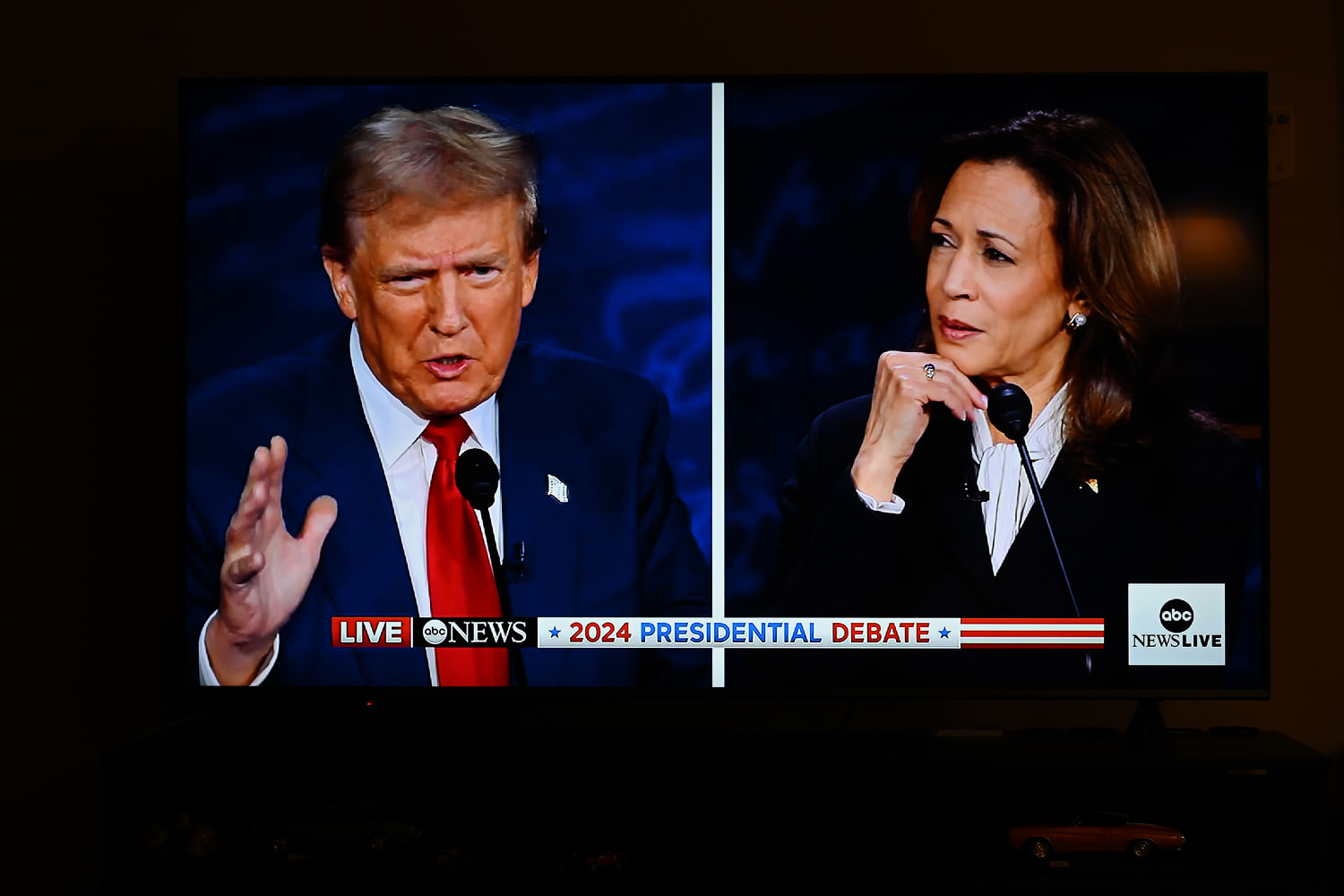
It was the slightest bit disarming when it happened — “I’m talking now, if you don’t mind, please,” former President Donald Trump said during Tuesday’s presidential debate. He was trying to use the “I’m speaking” line on Vice President Kamala Harris, the same way Harris used it on Mike Pence during their 2020 vice presidential debate. “Does that sound familiar?” Trump quipped with a little smirk, as if to make it completely obvious he was being cute, performing a hostile homage.
That moment when Trump told Harris he was ‘talking now’ reminded a lot of us of what it’s still like to be a woman in the world.
I’d say this was one of the very few times being a powerful, white man did not benefit Trump. Women are used to being interrupted. That’s why when Harris said it to Pence in 2020 it was such a powerful encapsulation of the experience of female life. Trump tried to make the line his, but he flailed and failed, and that quickly became a theme of the debate. And somehow, Harris used the power imbalance to be powerful. She was able to bait Trump by mentioning the crowd size at his rallies. She was able to use the optics of a woman standing up for herself to her advantage.
That moment when Trump told Harris he was “talking now” reminded a lot of us of what it’s still like to be a woman in the world. That line, coming from Trump, somehow served as a brutal reminder of what his administration took from our gender — the right to bodily autonomy.
One of the sometimes subtle, sometimes not-so-subtle threads running through this entire truncated Harris-Trump campaign cycle has been misogyny. The thrice-married adulterer Trump, who paid off not one but two women during the 2016 campaign cycle, is someone who behaves in a deeply misogynistic way. Not that that’s enough to disqualify him in the minds of many American voters.
Most of the time, that misogyny and sexism is focused on Harris, like when Trump posted a crude sexist meme about her on his social media platform. And Trump is not the only one to delight in this sexist commentary. You could say his running mate, JD Vance, sometimes almost makes Trump look like a feminist: Whereas Trump has flip-flopped on the matter, Vance vocally supports a national abortion ban, as he told a podcast in 2022: “I certainly would like abortion to be illegal nationally.” Vance has somehow managed to double down on some of Trump’s worst instincts, from his comments about childless cat ladies to his belief that post-menopausal women exist to care for their grandchildren.
“Quiet, please,” Trump said at another point during the debate, as Harris tried to interject with an answer. Once again, it didn’t work, landing with a patronizing thud. During the debate, it became clear to me that Harris has more available to her than female politicians historically have. So she was able to take the high road, to ignore his pettiness. And by not overly focusing on her own identity, she’s been able to allow Trump to bait himself into obsessing about it.
“Quiet, please,” Trump said at another point during the debate, as Harris tried to interject with an answer. Once again, it didn’t work, landing with a patronizing thud.
A number of Republicans showed us who they were that debate night. The sexism was largely focused on details that somehow mattered a lot when it came to Harris, but not at all when it came to her male opponent. GOP pollster Frank Luntz posted, “If she wants to win, Harris needs to train her face not to respond. It feeds into a female stereotype and, more importantly, risks offending undecided voters.” The sexism here rests in the notion that women’s faces must always be pleasing to the viewer, part of an old, tired notion that many of us are very weary of.
But for a lot of people, the impact of Harris’ debate performance has landed very differently. One Georgia swing-state voter told Sarah Longwell for a piece she wrote in The Atlantic, “I was actually pleasantly surprised at Harris. She addressed most of the issues pretty well, and she gave Donald Trump what other candidates couldn’t. She was a little bit sarcastic, talking back with him, which I appreciated.” It turns out there’s more available to women politicians than there used to be in the 1980s, when Luntz was in his prime.
The world has changed since Geraldine Ferraro was the first woman to run for vice president. It’s even changed since Hilary Clinton’s 2016 campaign, when a confident, pantsuited former secretary of state failed to break the glass celling by only a few thousand voters in a few swing states.
Roe is no longer the law of the land. Women know what it’s like to lose. Harris showed us there’s more available to women politicians than ever before. Can she translate that to an electoral victory? No one knows. But she’s making space for herself and showing others that they can, too.
